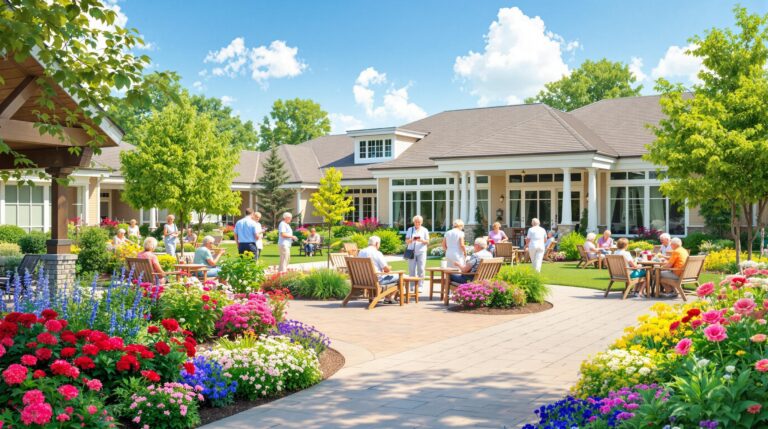Specialized Support for Cognitive Decline
Memory care represents a specialized branch of senior living focused on helping individuals with Alzheimer’s disease, dementia, or other forms of memory impairment. In many assisted living facilities, memory care operates as a dedicated wing or unit, staffed by caregivers trained in dementia-specific strategies—like validation therapy, redirection, and consistent daily routines. By integrating memory care within the broader assisted living structure, families gain a continuum of services: a resident can transition seamlessly to heightened support if cognitive challenges worsen. To explore how we handle this progressive approach, check our Assisted Living page, where we detail memory care programs designed for varied stages of cognitive decline.
Environment and Design
Memory care units typically feature an environment optimized for those with dementia, minimizing triggers that might cause confusion or distress. Layouts often follow circular corridors—allowing safe wandering without dead ends—and rely on color cues or visual landmarks instead of complex signage. Secured doors and enclosed courtyards prevent residents from accidentally leaving the premises. Soft, even lighting and reduced noise levels help keep agitation at bay. At our Assisted Living communities, memory care sections incorporate homelike decor, comfortable lounges, and memory boxes outside each room, filled with personal mementos that reinforce familiarity.
Daily Structure and Therapeutic Activities
- Scheduled Routine: Predictable mealtimes and consistent caregivers reduce anxiety for those with short-term memory loss.
- Brain Exercises: Simple puzzles, art therapy, or music sessions stimulate cognitive function and encourage creativity.
- Sensory Stimulation: Aromatherapy, textured objects, or therapeutic touch can calm agitation and awaken pleasant memories.
- Physical Movement: Gentle stretches, guided walks, or chair dancing maintain mobility and help regulate mood.
These daily engagements anchor residents who might otherwise be disoriented. Activities focus on preserving existing skills, promoting social connections, and sparking joy in small moments—like recognizing a familiar song lyric. Since memory care residents often respond well to routine, each day unfolds in predictable segments, leaving room for spontaneous interactions but avoiding abrupt changes. For a closer look at the specialized programs we provide, see our Assisted Living memory care details.
Staff Expertise and Family Communication
Trained professionals in memory care divisions understand the nuances of Alzheimer’s and dementia-related conditions. They learn techniques to de-escalate behavioral outbursts, prevent wandering, and encourage calm transitions between activities. Regular assessments help staff track cognitive shifts or emerging medical concerns, adjusting care strategies as needed. Families are kept in the loop through care conferences, phone calls, or online portals, ensuring that loved ones remain involved in major decisions. Relatives often experience relief, knowing their family member receives specialized oversight around the clock. At our Assisted Living communities, we emphasize open communication, welcoming family visits and even hosting support groups for caregivers to share experiences and advice.
Transitioning to Memory Care
Initially, a senior may live in the general assisted living area, only moving to memory care when cognitive impairment reaches a stage that demands closer supervision. This fluid transition prevents the shock of relocating to a new facility altogether. Some families anticipate these needs early, opting to move their loved one directly into a memory care unit to establish routine and familiarity. Regardless of timing, the shift should involve discussions with healthcare providers, senior living administrators, and, if possible, the resident themselves. Clarity about how memory care differs—such as increased staff-to-resident ratios or dedicated therapeutic sessions—can make the process smoother. In short, memory care is a cornerstone for many older adults dealing with dementia, providing an environment attuned to their unique vulnerabilities and potential. If you suspect your loved one might benefit from advanced cognitive support, visit our Assisted Living page to explore memory care features, staff credentials, and the inclusive philosophy that keeps every resident feeling respected and safe.









